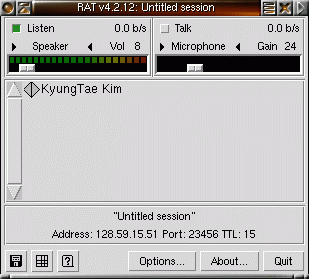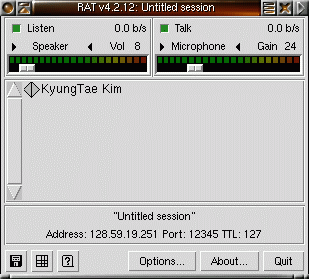sip-mbus interface
sip-mbus interface Description sipc_mbus_control NAME sipc_mbus_control - initialize the mbus library
SYNOPSIS
#include "sip_mbus_control.h"
int sipc_mbus_control(ClientData dummy, Tcl_Interp *interp, int argc, char **argv);
The sipc_mbus_control() function provides for initialization of mbus library.
The argv[1] argument is NULL.
sip_mbus_rtp_addr NAME sip_mbus_rtp_addr - change the remote IP address, src/dst port number and ttl of RAT
SYNOPSIS
#include "sip_mbus_control.h"
int sipc_mbus_rtp_addr(ClientData dummy, Tcl_Interp *interp, int argc, char **argv);
The sipc_mbus_rtp_addr() function provides for control over IP address, port number and ttl.
The sipc_mbus_rtp_addr takes four arguments.
- argv[1] remote IP address
- argv[2] source port number
- argv[3] destination port number
- argv[4] time-to-live
sipc_mbus_talk NAME sipc_mbus_talk - enable/disable of talk
SYNOPSIS
#include "sip_mbus_control.h"
int sipc_mbus_talk(ClientData dummy, Tcl_Interp *interp, int argc, char**argv);
The sipc_mbus_talk() function enables or disables of talk of RAT.
The sipc_mbus_talk takes one argument.
- argv[1] 0: talk, 1: mute
sipc_mbus_codec NAME sipc_mbus_codec - changes the codec
SYNOPSIS
#include "sip_mbus_control.h"
int sipc_mbus_codec (ClientData dummy, Tcl_Interp *interp, int argc, char**argv);
The sipc_mbus_codec () function changes the codec of RAT to encode.
The sipc_mbus_codec takes one argument.
- argv[1]
- l16: Linear 16, 128 kbit/s: Uncompressed 16 bit samples
- pcma: A-Law, 64 kbit/s: a-law companded 8 bit samples
- pcmu: Mu-Law, 64 kbit/s: mu-law companded 8 bit samples.
- dvi: DVI-ADPCM, 32 kbit/s: 16 bit samples.
- gsm: GSM, 13.2 kbit/s:
- lpc: LPC, 5.8 kbit/s
sipc_mbus_packetization NAME sipc_mbus_codec - sets the number of codec frames
SYNOPSIS
#include "sip_mbus_control.h"
int sipc_mbus_codec (ClientData dummy, Tcl_Interp *interp, int argc, char**argv);
The sipc_mbus_codec () function sets the number of "units" (codec frames, typically) placed in each packet when transmitting.
The sipc_mbus_codec takes one argument.
- argv[1]: units: 1, 2, 4 or 8
Program internal operation
sipc should spawn sip-mbus controller (sip_mbus_control.c) to send and receive mbus command to and from RAT before it uses mbus library (mbus_control.c). The sip-mbus controller not only sends mbus.hello mbus command as a heartbeat message every second to indicate liveness, but also receives mbus.hello of other mbus engines.
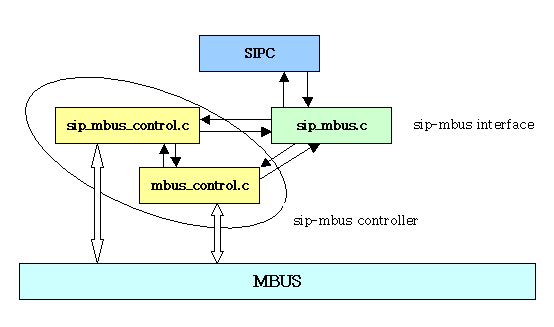
sipc_mbus_control
This function should be called before other mbus-controller function calls because this initialize the mbus library. sipc_mbus_control calls sip_mbus_control() function which initializes the mbus library and sends mbus.hello command and receives it periodically.
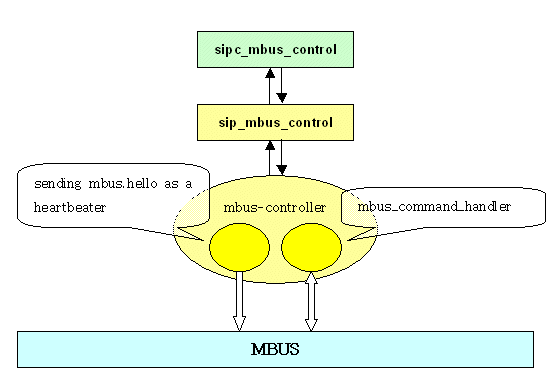
void sip_mbus_control () {
/* create the mbus address of sip-mbus controller */
/* initialization of mbus library */
mbus_init(mbus_control_rx, mbus_err_handler, c_addr);
while (true) {
/* send mbus.hello command */
mbus_send(m);
/* mbus handler process the received mbus command */
mbus_recv(m, m, &timeout);
}
}
sip_mbus_rtp_addr
sipc sends rtp.addr.change mbus command calling rtp_addr_change() of sip-mbus controller to change remote IP address, src/dst port number and ttl. Before it sends the command, it should encode them using mbus_encode_str() function. This command should be sent to the mbus_engine of RAT. If this command is being sent to user interface or controller of RAT, they will be exit abnormally.
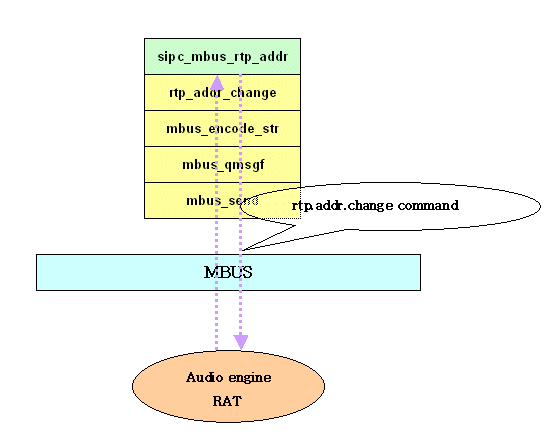
mbus_qmsgf (mbus, addr_rat_engine, reliable, mbus_command, "%s %d %d %d", ip_addr, src, dst, ttl);
mbus: mbus library
addr_rat_engine: the mbus address of the mbus engine of RAT
reliable: TRUE or FALSE
mbus_command: rtp.addr.change mbus command
arguments: encoded string of "ip-addr src_port dst_port ttl".
sipc_mbus_talk, sipc_mbus_codec and sipc_mbus_packetization
All procedure is similar to rtp_addr_change() function except using different mbus commands.
sipc_mbus_talk: audio.input.mute
sipc_mbus_codec: tool.rat.codec
sipc_mbus_packetization: tool.rat.rate
